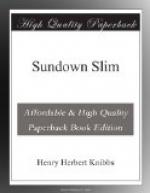And Wingle, fat, bald, and deliberate, chuckled as he dug among his belongings and brought forth the coveted riding apparel. “Them chaps has set on some good hosses, if I do say it,” he remarked. “Take ’em and keep your nine bucks for life insurance. You’ll need it.”
Sundown grinned like a boy. “Nope. A bargain’s a bargain. Here’s the money. Mebby you could buy a fust-class cook-book with it and learn somethin’.”
“Learn somethin’! Why, you long-geared, double-jointed, glass-eyed, hay-topped, star-smellin’ st-st-steeple, you! Get out o’ this afore I break my neck tryin’ to see your face! Set down so I can look you in the eye!” And Wingle waved his stout arms and glowered in mock anger.
Sundown laid the money on the table. “Keep the change,” he said mildly with a twinkle in his eye.
He picked up the chaps and stalked from the bunk-house. Chance, who had been an interested spectator of this lively exchange of compliment and merchandise, followed his master to the stable where Sundown at once put on the chaps and strutted for the dog’s benefit, and his own. By degrees he was assuming the characteristics of a genuine cow-puncher. He would show the folks in Antelope what a rider for the Concho looked like.
The following morning, much earlier than necessary, he mounted and rode to the bunk-house, where Corliss gave him the letter and told him to leave the horse at the stables in Antelope until he returned from Usher.
Sundown, stiffened by the importance of his mission, rode straight up, looking neither to the right nor to the left until the Concho was far behind him. Then he slouched in the saddle, gazing with a pleased expression first at one leather-clad leg and then the other. For a time the wide, free glory of the Arizona morning mesas was forgotten. The shadow of his pony walked beside him as the low eastern sun burned across the golden levels. Long silhouettes of fantastic buttes spread across the plain. The sky was cloudless and the crisp thin air foretold a hot noon. The gaunt rider’s face beamed with an inner light—the light of romance. What more could a man ask than a good horse, a faithful and intelligent dog, a mission of trust, and sixty undisturbed miles of wondrous upland o’er which to journey, fancy-free and clad in cowboy garb? Nothing more—except—and Sundown realized with a slight sensation of emptiness that he had forgotten to eat breakfast. He had plenty to eat in his saddle-bags, but he put the temptation to refresh himself aside as unworthy, for the nonce, of his higher self. Naturally the pent-up flood of verse that had been oppressing him of late surged up and filled his mind with vague and poignant fancies. His love for animals, despite his headlong experiences on the Concho, was unimpaired, so to speak. He patted the neck of the rangy roan which he bestrode, and settled himself to the serious task of expressing his inner-most being in verse. He dipped deep into the Pierian springs, and poesy broke forth. But not, however, until he had “cinched up,” as he mentally termed it, the saddle of his Pegasus of the mesas.




